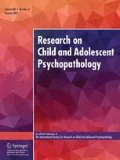Abstract
Attributions reported by 115 mothers and 122 adolescents were examined as they related to family conflict. Subjects completed measures of parent-adolescent conflict (Issues Checklist, Conflict Behavior Questionnaire) and the Mother-Adolescent Attribution Questionnaire. The results revealed that parent-adolescent conflict correlated with mothers' and teenagers' negative attributions. Specifically, self-reported conflict was positively correlated with mothers' and teenagers' beliefs that one another's negative behavior was intentional, selfishly motivated, and blameworthy.
Similar content being viewed by others
References
Berley, R. A., & Jacobson, N. S. (1984). Causal attributions in intimate relationships: Toward a model of cognitive-behavioral marital therapy.Advances in Cognitive Behavioral Research and Therapy, 3, 1–60.
Bradbury, T. N., & Fincham, F. D. (1989, August).An instrument for assessing attributions in marriage: Rationale and initial validation. Paper presented at the meeting of the American Psychological Association, Washington, DC.
Dyck, R. J., & Rule, B. G. (1978). Effect on retaliation of causal attributions concerning attack.Journal of Personality and Social Psychology, 36, 521–529.
Fincham, F. D. (1985). Attribution processes in distressed and nondistressed couples: 2. Responsibility for marital problems.Journal of Abnormal Psychology, 94, 183–190.
Fincham, F. D., Beach, S. R., & Nelson, G. (1987). Attribution processes in distressed and nondistressed couples: 3. Causal and responsibility attributions for spouse behavior.Cognitive Therapy and Research, 11, 71–86.
Fincham, F. D., & Bradbury, T. N. (1987). The impact of attributions in marriage: A longitudinal analysis.Journal of Personality and Social Psychology, 53, 510–517.
Fincham, F. D., & Bradbury, T. N. (1988). The impact of attributions in marriage: Empirical and conceptual foundations.British Journal of Clinical Psychology, 27, 77–90.
Fincham, F. D., & Bradbury, T. N. (1992). Assessing attributions in marriage: The relationship attribution measure.Journal of Personality and Social Psychology, 62, 451–468.
Fincham, F. D., Bradbury, T. N., & Grych, J. H. (in press). Conflict in close relationships: The role of interpersonal phenomena.Advances in Applied Social Psychology.
Forehand, R., Brody, G., Slotkin, J., Fauber, R., McCombs, A., & Long, N. (1988). Young adolescents and maternal depression: Assessment interrelations and family predictors.Journal of Consulting and Clinical Psychology, 56, 422–426.
Forehand, R., Long, N., Brody, G. H., & Fauber, R. (1986). Home predictors of young adolescents' school behavior and academic performance.Child Development, 57 1528–1533.
Foster, S. L., & Robin, A. L. (1988). Family conflict and communication in adolescence. In E. J. Mash & L. G. Terdel (Eds.),Behavioral assessment of childhood disorders (2nd ed.). New York: Guilford Press.
Hollingshead, A. (1975). Four factor index of social status. Working paper.
Hotaling, G. T. (1980). Attribution process in husband-wife violence. In M. A. Straus, & G. T. Hotaling (Eds.),The social causes of husband-wife violence (pp. 136–154). Minneapolis: University of Minnesota Press.
Ingelfinger, J. A., Mosteller, R., Thibodeau, L. A., & U. Ware, J. H. (1987).Biostatistics in clinical medicine (2nd ed.). New York: MacMillan.
Jacobson, N. S., Waggoner McDonald, D., Follette, W. C., & Berley, R. A. (1985). Attributional processes in distressed and nondistressed married couples.Cognitive Therapy and Research, 9, 35–50.
Larrance, D., & Twentyman, C. (1983). Maternal attributions and child abuse.Journal of Abnormal Psychology, 92, 449–457.
Montemayor, R. (1983). Parents and adolescents in conflict: All families some of the time and some families most of the time.Journal of Early Adolescents, 3, 83–103.
Myers, R. H. (1986).Classical and modem regression with applications (pp. 103–111). Boston: Duxbury Press.
Prinz, R. J., Foster, S., Kent, R. N., & O'Leary, K. D. (1979). Multivariate assessment of conflict in distressed and nondistressed mother-adolescent dyads.Journal of Applied Behavior Analysis, 12, 691–700.
Robin, A. L., & Canter, W. (1984). A comparison of the marital interaction coding system and community ratings for assessing mother-adolescent problem-solving.Behavioral Assessment, 6, 303–313.
Robin, A. L., & Foster, S. L. (1989).Negotiating parent-adolescent conflict. New York: Guilford Press.
Robin, A. L., Koepke, T., & Nayer, M. (1986). Conceptualizing, assessing, and treating parent-adolescent conflict. In B. B. Lahey & A. E. Kazdin (Eds.),Advances in clinical child psychology (Vol. 9, pp. 87–131). New York: Plenum Press.
Robin, A. L., & Weiss, J. G. (1980). Criterion-related validity of behavioral and self-report measures of problem-solving communication skills in distressed and non-distressed parent-adolescent dyads.Behavioral Assessment, 2, 339–352.
Silverberg, S. B., & Steinberg, L. (1987). Adolescent autonomy, parent-adolescent conflict, and parental well-being.Journal of Youth and Adolescence, 16, 293–312.
Slater, E. J., & Haber, J. D. (1984). Adolescent adjustment following divorce as a function of familial conflict.Journal of Consulting and Clinical Psychology, 52, 920–921.
Vincent Roehling, P., & Robin, A. L. (1986). Development and validation of the Family Beliefs Inventory: A measure of unrealistic beliefs among parents and adolescents.Journal of Consulting and Clinical Psychology, 54, 693–697.
Author information
Authors and Affiliations
Rights and permissions
About this article
Cite this article
Grace, N.C., Kelley, M.L. & McCain, A.P. Attribution processes in mother-adolescent conflict. J Abnorm Child Psychol 21, 199–211 (1993). https://doi.org/10.1007/BF00911316
Revised:
Issue Date:
DOI: https://doi.org/10.1007/BF00911316




